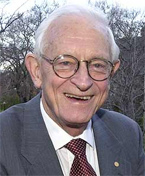A Great Mind Remembered
NZ Nobel laureate, Alan Graham MacDiarmid, has died in Philadelphia aged 79. Professor MacDiarmid won the 2000 Nobel Prize in chemistry for his joint discovery that some plastics could be made to conduct electricity by incorporating impurities. The finding laid the foundations for next generation plastics, with offshoot innovations including “smart” sunlight-reflecting windows, televisions and computer screens, luminous traffic signs and light-emitting wallpaper. Born in Masterton, MacDiarmid grew up in Kerikeri and the Hutt Valley during the Depression. He funded his part-time chemistry degree at Victoria University by shovelling coal and sweeping floors at the institution before winning a Fulbright Scholarship to study in America in 1950. He spent most of his academic life at Pennsylvania University and has published more than 600 scientific papers. US colleague Dr Hsuan Feng likens MacDiarmid to fellow NZ Nobel winner Ernest Rutherford: “Rutherford discovered radioactivity that changed the world in the 20th century, and Alan MacDiarmid discovered conducting polymers that will change the economy of the 21st century.” MacDiarmid was awarded the Rutherford Medal (NZ’s top science prize) and made a Member of the Order of NZ in 2001. Paul Callaghan, director of the MacDiarmid Institute at Victoria University Wellington, describes him as a New Zealand superhero and says MacDiarmid never forgot his roots as a New Zealander. “I think Alan is to science and technology what Ed Hillary is to the outdoors. He’s a superhero. Although people may not know exactly what Alan did, the fact that he won a Nobel Prize is a big thing and I think that New Zealanders love other New Zealanders who get out there in the world and take on the best and win… he’s shown what’s possible for Kiwis.”
Alan Graham MacDiarmid: 14 April 1927 – 7 February 2007














